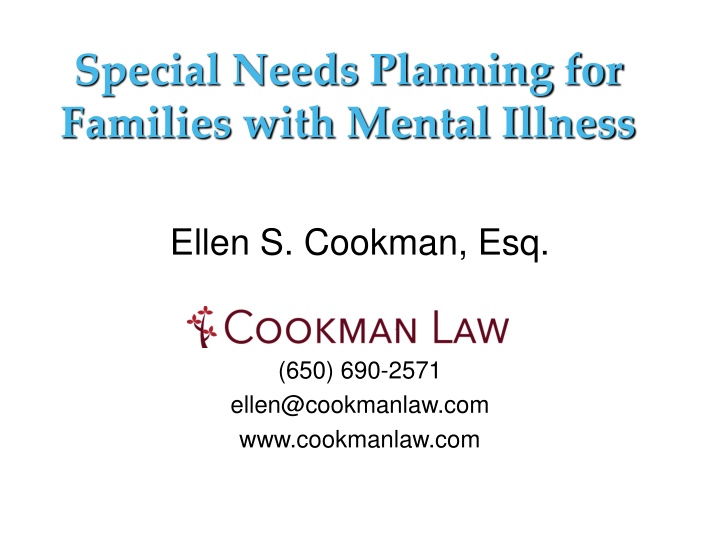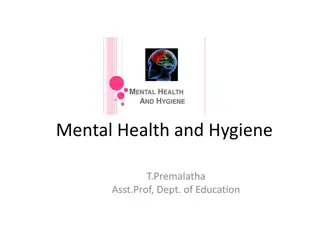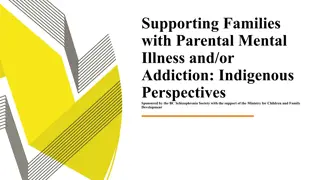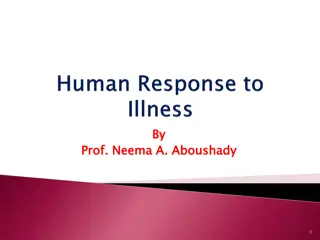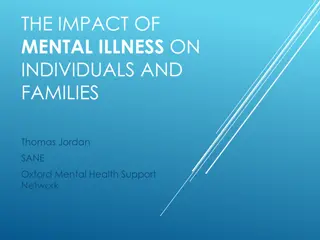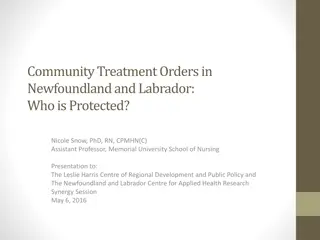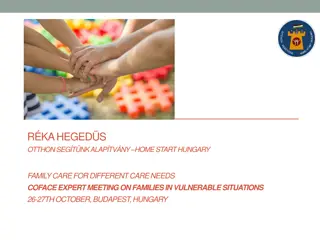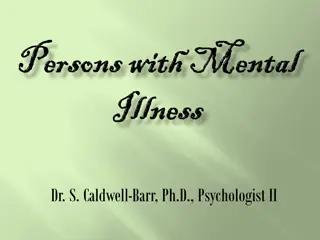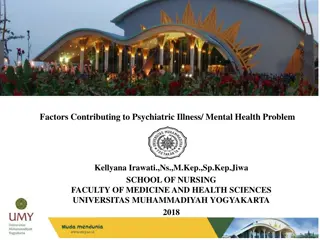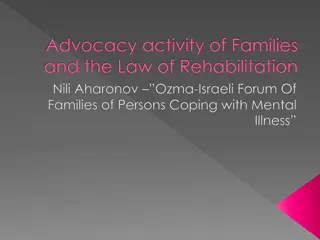Special Needs Planning for Families with Mental Illness - Comprehensive Guide
Explore the specialized field of special needs planning for families dealing with mental illness. Learn about estate planning goals, public benefits, special needs trusts, different types of SNTs, and choosing the right trustee to safeguard the future well-being of your loved one. Gain insights from legal expert Ellen S. Cookman, Esq., and ensure a secure financial future for your family member with special needs.
Download Presentation

Please find below an Image/Link to download the presentation.
The content on the website is provided AS IS for your information and personal use only. It may not be sold, licensed, or shared on other websites without obtaining consent from the author.If you encounter any issues during the download, it is possible that the publisher has removed the file from their server.
You are allowed to download the files provided on this website for personal or commercial use, subject to the condition that they are used lawfully. All files are the property of their respective owners.
The content on the website is provided AS IS for your information and personal use only. It may not be sold, licensed, or shared on other websites without obtaining consent from the author.
E N D
Presentation Transcript
Special Needs Planning for Families with Mental Illness Ellen S. Cookman, Esq. (650) 690-2571 ellen@cookmanlaw.com www.cookmanlaw.com
Ellen S. Cookman, Esq. Certified Specialist, Estate Planning, Trust and Probate Law, The State Bar of California Board of Legal Specialization Principal, Cookman Law, PC J.D., UC Berkeley School of Law LL.M., Estate Planning, Golden Gate University Law Clerk, Chief Judge Anthony J. Scirica, Third Circuit Court of Appeals (Philadelphia, PA) Volunteer for Sunday School program for children with special needs California State Bar No. 227833 2
Estate Planning Goals Maximize quality of life Protect child Maximize independence Maximize public benefits Name surrogate parents Avoid court system 3
Public Benefits At a Glance Income Stream Health Insurance Supplemental Security Income (SSI) Medi-Cal (Medicaid) Needs- based ( $2K) (includes In Home Support Services (IHSS)) Social Security Disability Insurance (SSDI) Entitle ment- based Medicare (includes Child Disability Benefits (CDB)) 4
Special Needs Trust Irrevocable trust Holds assets for disabled person s benefit DOES NOT interfere with public benefits Like a safety net! 5
Which Type to Establish? Third Party First Party 6
Different Types of SNTs Source of Funds Who Establishes Distribution On Death Anyone except beneficiary Anyone except beneficiary Grantor s wishes Third Party SNT Disabled beneficiary s funds before age 65 Beneficiary, parent, grandparent, Guardian, Court Medi-Cal payback; then remainder beneficiaries First Party (d)(4)(A) SNT Disabled beneficiary s funds Beneficiary, parent, grandparent, Guardian, Court Non-profit Trustee; or, Medi-Cal payback; then remainder beneficiaries (d)(4)(C) Pooled SNT 7
Choice of Trustee Family Member Friend Private Professional Fiduciary Bank Nonprofit Pooled Trust Combination 8
Oversight Available for SNT? Typically NO court involvement Trust Protector Co-Trustees Advisory Committee 9
Memorandum of Intent (separate from SNT) Informal letter from parent: What makes child happy/sad? Food restrictions? Housing preferences Favorite Activities 10
Retirement Accounts and SNTs RECENT DEVELOPMENT: SECURE Act (effective Jan. 1, 2020) eliminated stretch benefits for non-spouses without beneficiaries Old rule: RMD was calculated to lifespan of beneficiary New rule: Most individuals must distribute IRAs within 10 years and pay all taxes. BUT there are exceptions: a disabled person or SNT can still be named as a beneficiary of an IRA and receive stretch benefits! 11
Retirement Accounts and SNTs Result: More parents are naming disabled child s SNT as beneficiary of retirement accounts, as opposed to naming typical child outright as beneficiary 12
ABLE Act Account: What Is It? Savings account for disabled person with Medi-Cal payback provision (but not in California ) Does not interfere with public benefits (with limitations) Income earned grows tax-free, and qualified withdrawals are tax-free 13
ABLE Act Account: Eligibility and Limitations To be eligible: Beneficiary must have a qualifying disability, AND Beneficiary s disability must have started before beneficiary turned age 26 Meant to be used only for qualified disability expenses Only one ABLE Act account can be established per disabled individual 14
ABLE Act Account: More Information Contribution limits of $15,000/year (as of 2020) from ALL sources SSI suspended if total amount in account exceeds $100,000 Medi-Cal payback requirement waived in California (as of 10/4/17) 15
CalABLE Account CalABLE account now available: https://calable.ca.gov Need beneficiary s SSN, authorized legal rep s SSN, bank account info Reloadable, prepaid Visa debit card now available 16
Comparing ABLE Account with Third Party SNT Issues ABLE Account Third Party SNT Who can use? Only persons disabled before age 26 Anyone, including person with a disability Any person with a disability Anyone, except person with a disability (must use first party SNT) When did child become disabled? Current age of child? Size of contributions? Medi-Cal payback? Who can control? Person with a disability and likely their legal guardian, conservator, or agent Who inherits on death of person with disability to heirs (but exception in California) Who can fund? How many can person have? One Unlimited VS. Anyone except the person with a disability and their spouse Medicaid first, then can go Person with a disability s heirs or whomever is named in document 17
Comparing ABLE Account with Third Party SNT Issues ABLE Account Third Party SNT How much can fund in a year? $15,000 (or annual gift exemption) Unlimited Is funding gift-tax free? Yes No Is there a cap on how much can be in account? Yes, currently $100,000 limitation for SSI recipients and up to State 529-plan limitations No income tax No How is income taxed? Taxed as a non-grantor trust at highest marginal tax rate What type of distributions can be made? Only qualified disability expenses as defined by government No limitation, except for certain disbursements may reduce or eliminate SSI or Medicaid eligibility 18
Revocable Living Trust Holds parents assets Can be changed Names beneficiaries, successor trustees GOAL: Avoid Probate Court! 19
Typical AB Revocable Trust before 2013 Low estate tax exemption No portability Jones Family Trust First Death All Income Principal as Needed Bypass Trust Survivor s Trust Second Death Child #1 Child #2 Child #3 20
Typical Revocable Trust after 2013 Higher estate tax exemption Portability Jones Family Trust First Death Survivor s Trust Second Death SNT for Child #3 Lifetime Trust for Child #2 Lifetime Trust for Child #1 21
Decisions, Decisions! How should children receive inheritance? Outright At certain ages, i.e. 1/3 at ages 25, 30, 35 Lifetime trust Can offer protection from creditors, spouses Special Needs Trust Alternate Distribution (i.e. the Titanic) Certain individuals, category of individuals (i.e. settlor s nieces and nephews), charities 22
What about Conservatorships? Goals: Protect loved one Access information: medical, financial, etc. Make decisions on behalf of loved one General Conservatorshipsfor the elderly, those with dementia Limited Conservatorships for developmentally disabled individuals LPS Conservatorships for person who, as a result of a mental disorder and/or chronic alcoholism, is gravely disabled, i.e. unable to provide for his basic needs of food, clothing and shelter 23
LPS Conservatorship Steps Psychiatrist authorized to do LPS evaluations determines the person is gravely disabled Psychiatrist makes referral to Public Guardian s Office ( PGO ) while patient is in locked facility PGO files conservatorship petition Court gives order appointing conservator: could be relative, PGO, or private professional Lasts 1 year; conservator can petition to renew 24
Alternatives to Conservatorship Advance Health Care Directive (for medical decisions) Durable Power of Attorney (for financial decisions) Supported Decision Making See supporteddecisionmaking.org 25
Thank you for your attention! Please contact us for further information: (650) 690-2571 ellen@cookmanlaw.com www.cookmanlaw.com 26
